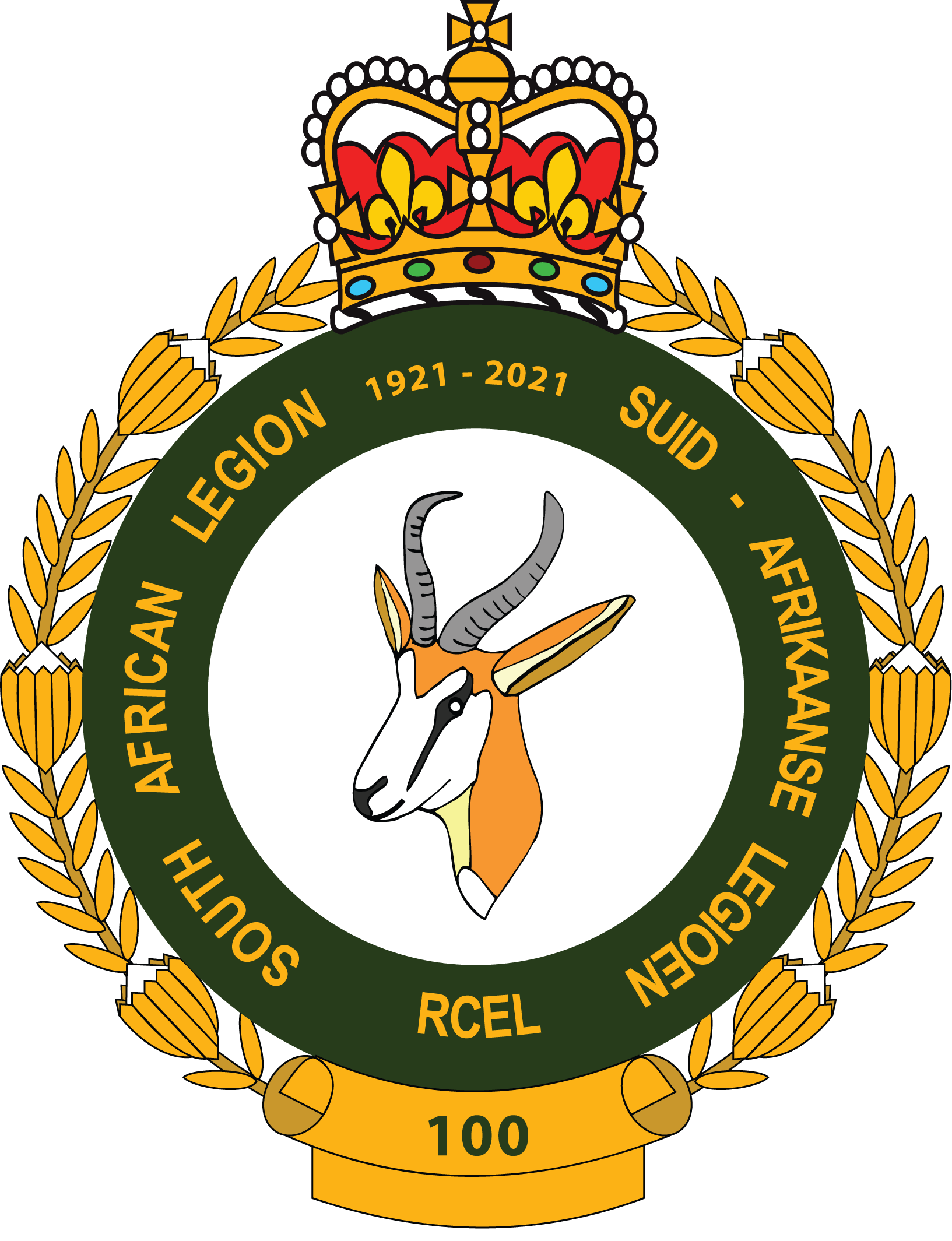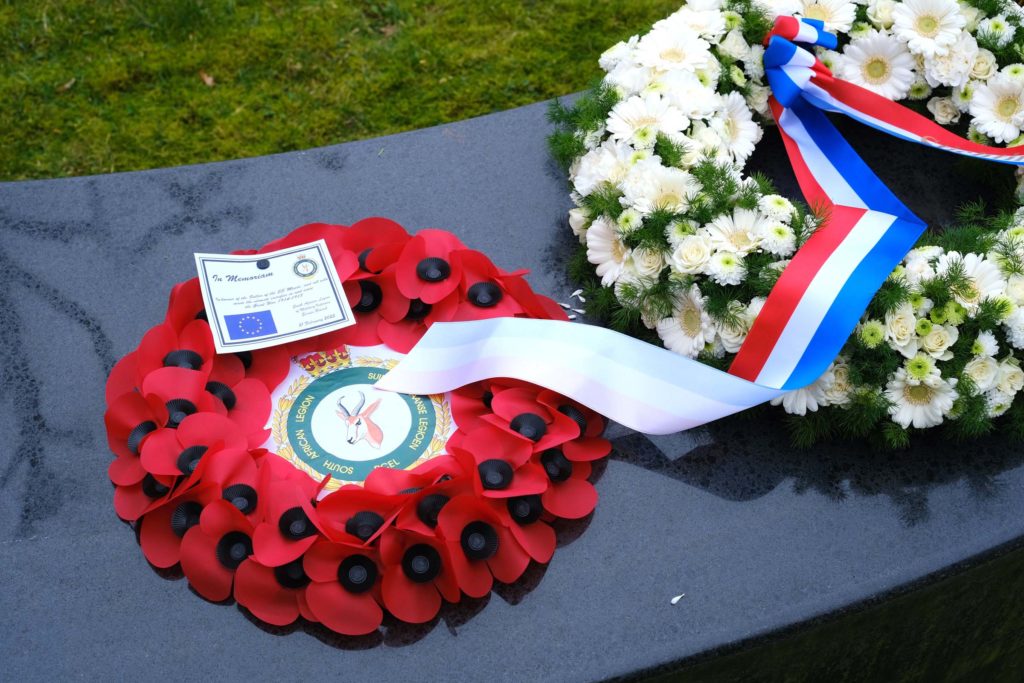
NOORDWIJK, ZUID HOLLAND – To mark the occasion of South African Armed Forces Day, the fallen South African servicemen of the SS Mendi – at least five, and possibly six of whom lie buried in the Commonwealth War Graves Commission (CWGC) section of Noordwijk General Cemetery in the Netherlands – were fittingly commemorated during a dignified service and wreath-laying ceremony today, after a two-year hiatus due to Covid restrictions.
In the annals of South Africa’s military history, 21 February 1917 is a dark day. It marks the sinking of the troopship SS Mendi after it collided with the SS Daro off the Isle of Wight, with the loss of 616 South African servicemen, 607 of them members of the South African Native Labour Corps: Zulu, Xhosa, Sotho, Swazi, and Tswana. They were ultimately bound for northern France, to join the allied war effort.
Today, the anniversary of the SS Mendi disaster is aptly the day on which South Africa remembers all her fallen soldiers and in particular the deadliest disaster in South African naval history. Across the country, parades and ceremonies will be held to commemorate those South Africans who paid the ultimate price in wars across the globe.
The event to commemorate the 106th anniversary of the tragedy this year, co-hosted by the Municipality of Noordwijk, the South African Embassy in The Hague, and the office of the South African Defence Attaché in Brussels, was attended by several international ambassadors, diplomats, defence attachés including Australia, Canada, UK, USA, and Zambia, a representative of the CWGC, local dignitaries, and members of the South African community in the Netherlands.
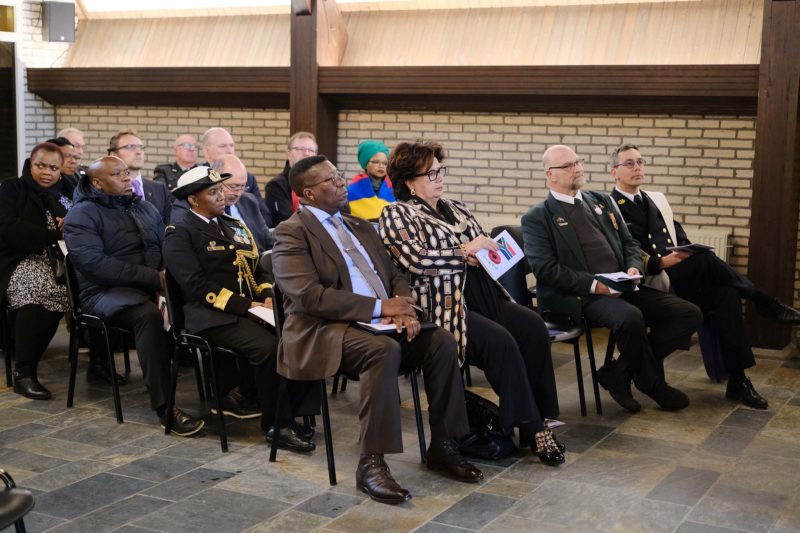
At the service in the cemetery hall, Royal Netherlands Navy Chaplain, LTZ1* Hilbrand van Eeken, led guests in hymns and prayer. The Mayor of Noordwijk, Alderman Wendy Verkleij, delivered a welcoming address, at which she affirmed her town’s commitment to preserving the memory of those Commonwealth and Allied servicemen, from both WWI and WWII, who lie buried in the CWGC section of the Cemetery, affirming that 21 February has become an entrenched annual event on Noordwijk’s municipal calendar.
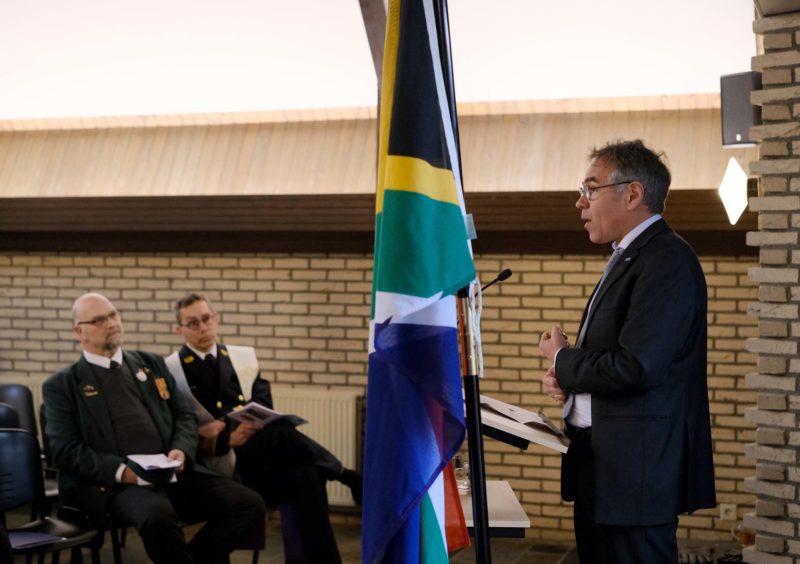
Local historian Mark Sijlmans, who has done extensive research and helped to identify exact positions of the Noordwijk SS Mendi graves, recounted his meeting with the descendants of some of the casualties when he travelled to South Africa, who had scant if any knowledge of the fate of their ancestor, apart from a vague notion that ‘he died in the war’. He highlighted that the family have expressed their keenness to travel to the Netherlands to perform the appropriate Zulu rituals to allow the spirit of their ancestor to return home.
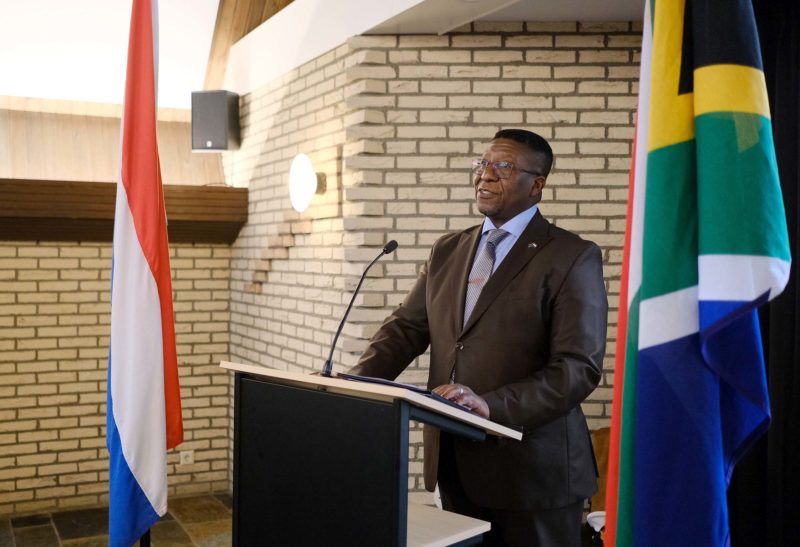
In his address, the South African Ambassador to the Netherlands, Vusi Madonsela, pledged his intention to facilitate a visit by the family to the graves, and highlighted its importance to the surviving descendants. Last year, in lieu of an official ceremony, Ambassador Madonsela joined the South African Legion, to plant new rose bushes at the graves.
South African Legion (Europe Branch) Chair, Andrew Bergman, highlighted the inscription on the CWGC Cross of Sacrifice, ‘Their Name Liveth For Evermore’, and emphasised the importance of continuity in remembrance that it implies. He pointed out that in the two years marked by the Covid pandemic, the SA Legion, who initiated the Noodwijk 21 February remembrance in 2015, has continued to lay wreaths and perform low-key Acts of Remembrance at the SS Mendi graves, within the constraints of the prevailing restrictions.
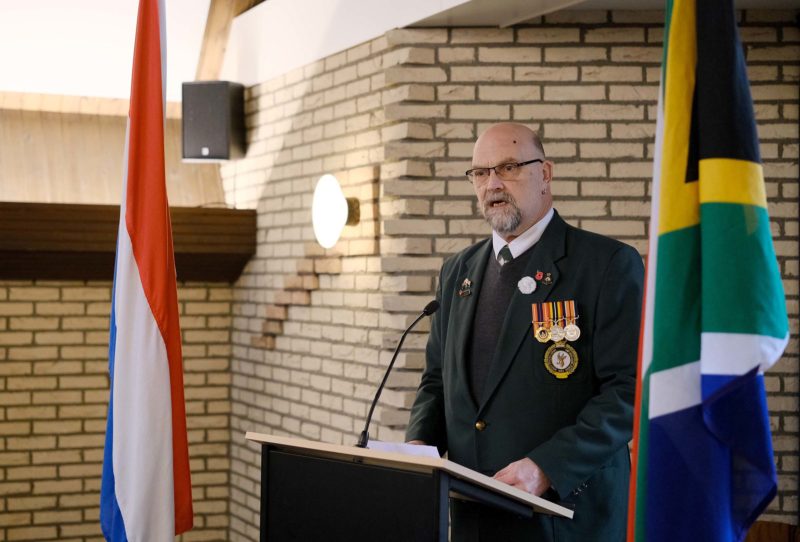
He lauded the ongoing efforts of the Municipality of Noordwijk, as well as the local Veteranen Noordwijk, to perpetuate the memory of the servicemen buried in their cemetery, and their visible efforts to involve the town’s young people: “It is immensely reassuring to see that a new generation is ready take up the torch of remembrance we carry today, and it’s comforting to know that for the fallen, including Privates Leboche, Zendile, Molide, Kazimula, and Mtolo, for many years to come, at the going down of the sun, and in the morning, we will remember them,” he said.
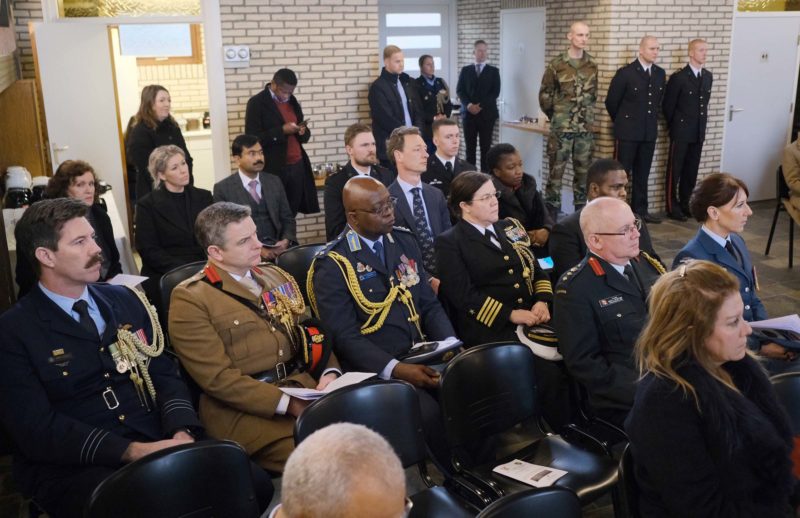
The service concluded with a reading by Netherlands-based South African filmmaker, Zeb Ngobese, of the poem in isiXhosa Ukutshona Kukamendi (The Sinking of the Mendi) by S.E.K. Mqhayi **.
Guests then followed two bagpipers to the gravesides, where SA Defence Attaché R. Adm. Gogi recited the Act of Remembrance preceding the wreath laying, Last Post, two minutes’ silence, Reveille, and the National Anthems of The Netherlands and South Africa.
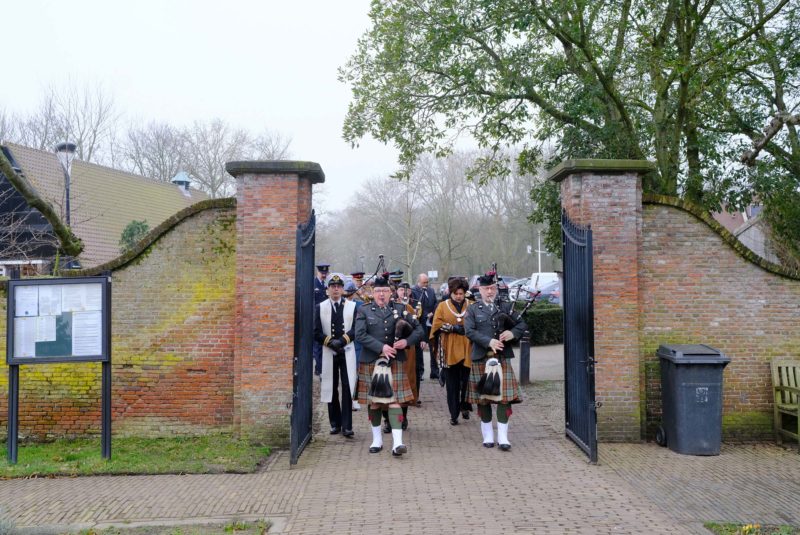
Following the event at the cemetery, the South African Embassy hosted an informal lunch reception at Noordwijk’s modern sports centre.
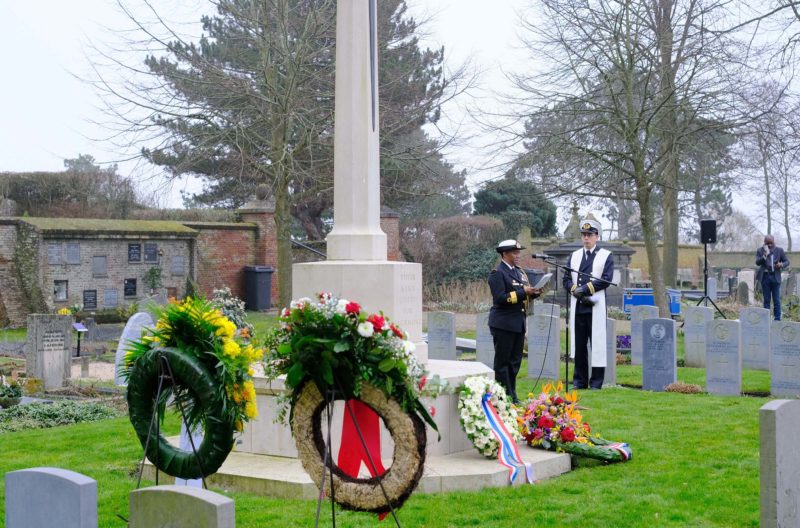
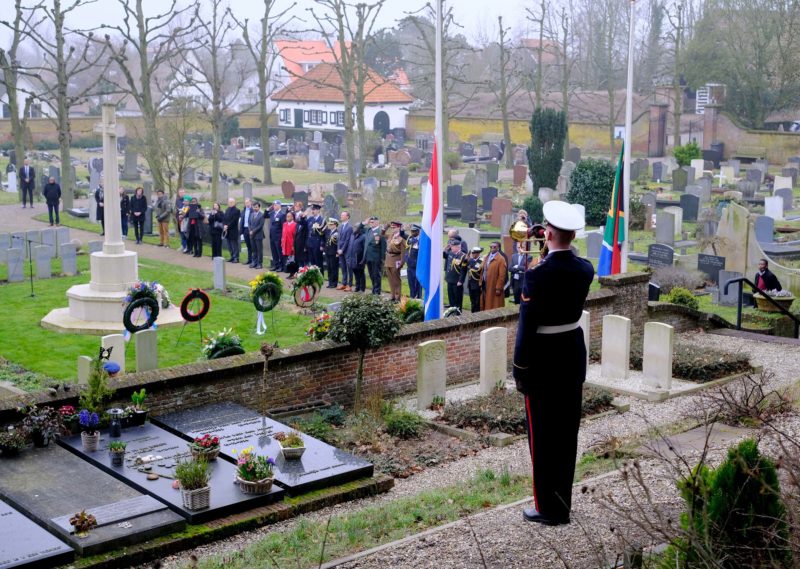
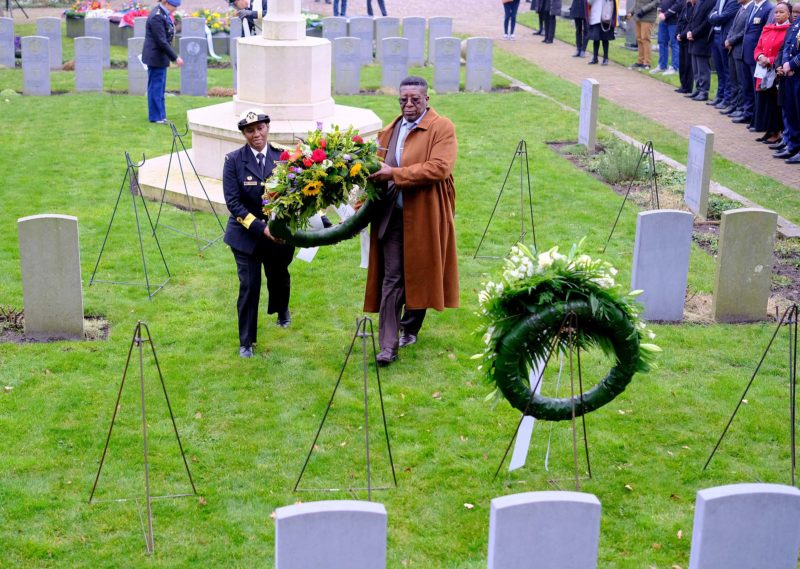
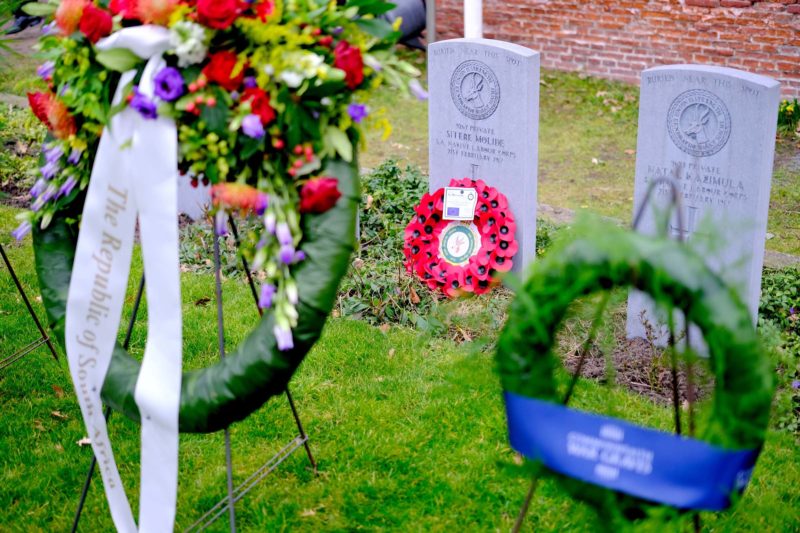
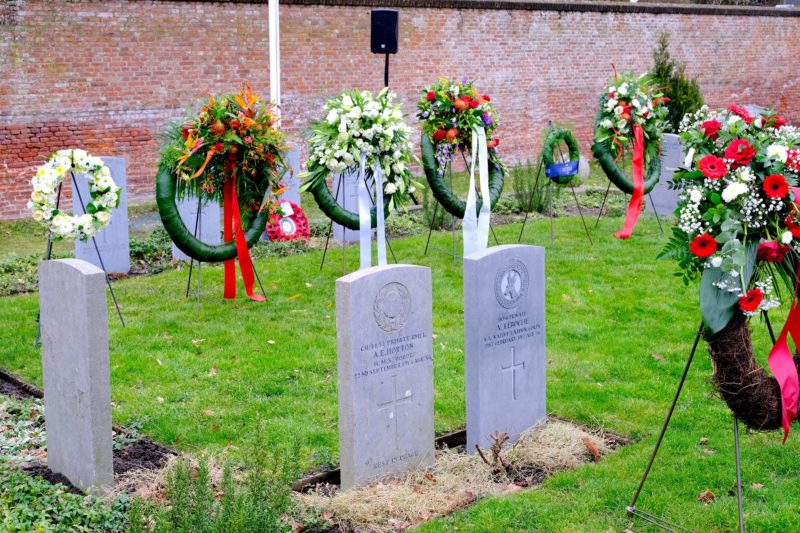
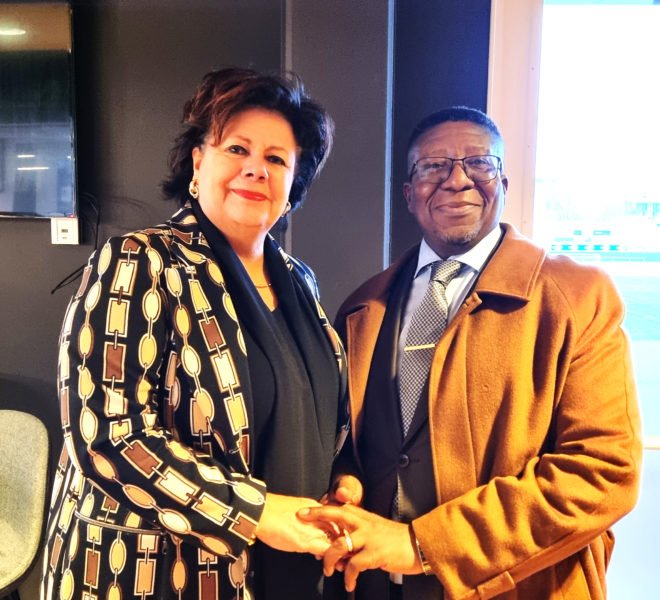
© Text: South African Legion (Europe)
Photography courtesy John Hogg
For local coverage (in Dutch), see:
* Royal Netherlands Navy rank LTZ1 (Luitenant-ter-zee der 1e klasse) is the equivalent of a Lieutenant Commander in Commonwealth navies.
** UKUTSHONA KUKAMENDI
S.E.K. Mqhayi
(See English translation below)
Ewe, le nto kakade yinto yaloo nto.
Thina, nto zaziyo, asothukanga nto;
Sibona kamhlope, sithi bekumelwe,
Sitheth’engqondweni, sithi kufanelwe;
Xa bekungenjalo bekungayi kulunga.
Ngoko ke, Sotase! Kwaqal’ukulunga!
Le nqanaw’, umendi, namhla yendisile,
Na’ligazi lethu lisikhonzisile!
Asinithenganga ngazo izicengo;
Asinithenganga ngayo imibengo;
Bekungenganzuzo zimakhwezikhwezi,
Bekungenganzuzo ingangeenkwenkwezi.
Sikwatsho nakuni, bafel’eAfrika,
KwelaseJamani yaseMpumalanga,
NelaseJamani yaseNtshonalanga.
Bekungembek’eninayo kuKumkani,
Bekungentobeko yenu kwiBritani.
Mhla nashiy’ ikhaya sithethile nani,
Mhla nashiy’iintsapo salathile kuni,
Mhla sabamb’izandla, mhla kwamanz’amehlo.
Mhla balil’oonyoko, bangqukrulek’ooyihlo,
Mhla nazishiy’ezi ntaba zakowenu,
Nayinikel’imiv’imilmb’ezwe lenu
Asitshongo na kuni, midak’ akowethu,
Ukuthi “Kwelo zwe nilidini lethu?”
Ngesibinge ngantonina ke kade?
Idini lomzi liyintonina ke kade?
Asingamathol’amaduna omzina?
Asizizithandwa zesizwe kade na?
Ngoku kuthethe ke siyendelisela,
Sibhekis’ezantsi, sihlahla indlela.
AsinguHabheli na idini lomhlaba?
AsinguMesiya na elasezulwini?
Thuthuzelekani ngoko, zinkedama!
Thuthuzelekani ngoko, bafazana!
Kuf’omnye kade mini kwakhiw’ omnye;
Kukhonza mnye kade’ ze kuphil’ abanye;
Ngala mazwi sithi, thuthuzelekani,
Ngokwenjenje kwethu sithi, yakhekani.
Lithatheni eli qhalo labadala,
Kuba bathi: “Akuhlanga lungehlanga!
Awu! Zaf’int’ezinkulu zeAfrika!
Isindiwe le nqanawa, ‘de yazika,
Kwaf’amakhalipha, amafa nankosi,
Agazi lithetha kwiNkosi yeeNkosi.
Ukufa kwawo kunomvuzo nomvuka
Ndinga ndingema nawo ngomhla wovuko,
Ndingqame njengomnye osebenzileyo,
Ndikhanye njengomso oqaqambileyo.
Makube njalo!
THE SINKING OF THE MENDI
S.E.K. Mqhayi
Yes, this thing flows as a normal thing from that.
The thing we know is not scared of that;
We say, things have happened as they should have,
Within our brains we say: it should have been so;
If it hadn’t been so, nothing would have come right.
You see Sotase, things came right when the Mendi sank!
Our blood on that ship turned things around,
It served to make us known through the world!
The British didn’t buy us with begging;
They didn’t seduce us with long strips of meat;
They didn’t bribe us with things as high as the stars,
They didn’t bribe us with profits.
We say unto those who died, you were Africans,
Those who died in the country of the rising sun,
Those who died in the country of the setting sun,
You didn’t die out of subservience for the king,
Nor because you wanted to kowtow to Britain.
On the day you left home, we talked,
On the day you left, we promised to look after your families,
On this day we shook hands, our eyes were wet.
On this day mothers cried, you fathers sobbed,
On this day you left the mountains of your birth,
You left the rivers of our country behind
We said to you, going there as dark-skinned men,
We said: “You are our sacrifice from here.”
Could we have sacrificed anything more precious?
What did it mean to sacrifice a village?
Was it not giving the bull calves of your homestead?
Sending those very ones who loved you as a nation?
We’re talking deep now; we have added our voice,
Proudly we are part of those opening the road to freedom.
In the way Abel was the sacrifice of the earth?
In the way the Messiah was the sacrifice of heaven?
Be consoled, all you orphans!
Be consoled, all you young widows!
Somebody has to die, so that something can be built;
Somebody has to serve, so that others can live;
With these words we say: be consoled,
This is how we build ourselves, as ourselves.
Remember the saying of the old people:
“Nothing comes down, without coming down.”
Awu! The finest of Africa was busy dying!
The ship couldn’t carry its precious cargo,
It was echoing into the inner circles,
Their brave blood faced the King of Kings.
Their deaths had a purpose for all of us
How I wish I could be with them,
How I wish I could stand with them on resurrection day,
How I wish I could sparkle with them like the morning star.
Let it be so!
Translated from isiXhosa by Antjie Krog
